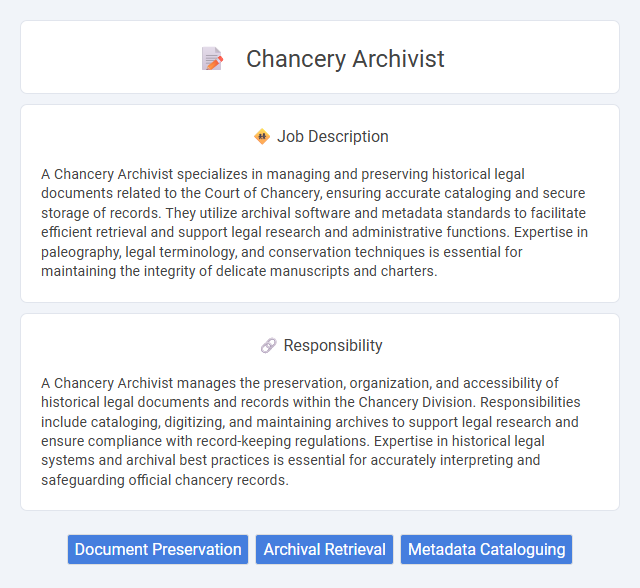
A Chancery Archivist specializes in managing and preserving historical legal documents related to the Court of Chancery, ensuring accurate cataloging and secure storage of records. They utilize archival software and metadata standards to facilitate efficient retrieval and support legal research and administrative functions. Expertise in paleography, legal terminology, and conservation techniques is essential for maintaining the integrity of delicate manuscripts and charters.
Individuals with strong organizational skills and a meticulous attention to detail are likely suitable for a Chancery Archivist role, as the job requires careful handling and cataloging of historical documents. Those who have patience, a passion for history, and the ability to work independently may find this position aligns well with their personal attributes. People prone to disorganization or who lack interest in archival work might struggle to meet the demands of this profession effectively.
Qualification
A Chancery Archivist must possess a degree in archival science, history, or information management combined with specialized knowledge in legal documents and records management. Proficiency in preservation techniques, cataloging standards such as ISAD(G), and digital archiving tools is essential to ensure the integrity and accessibility of historical legal archives. Experience with historical research, attention to detail, and strong organizational skills are critical qualifications for managing complex chancery records efficiently.
Responsibility
A Chancery Archivist manages the preservation, organization, and accessibility of historical legal documents and records within the Chancery Division. Responsibilities include cataloging, digitizing, and maintaining archives to support legal research and ensure compliance with record-keeping regulations. Expertise in historical legal systems and archival best practices is essential for accurately interpreting and safeguarding official chancery records.
Benefit
The Chancery Archivist role likely offers significant benefits including access to rare legal historical documents, which can enhance research opportunities and professional expertise. There is probable job stability due to the specialized nature of archival work combined with potential collaboration with legal historians and scholars. Employees may experience a rewarding sense of contributing to the preservation of important institutional heritage and legal records.
Challenge
The role of a Chancery Archivist likely involves the challenge of meticulously managing and preserving vast collections of historical legal documents under strict confidentiality and accuracy standards. Navigating the complexity of archaic records while ensuring their accessibility for research purposes may demand exceptional attention to detail and specialized knowledge. Balancing conservation priorities with the increasing need for digitization could present ongoing difficulties in resource allocation and technological adaptation.
Career Advancement
A Chancery Archivist manages, preserves, and organizes historical legal documents, specializing in property and land records. Expertise in archival science and legal history enhances opportunities for advancement into senior archival roles or specialized consultancy positions. Proficiency in digital archiving technologies and project management further accelerates career growth in both public institutions and private firms.
Key Terms
Document Preservation
Chancery Archivists specialize in the meticulous preservation of historical legal documents, ensuring their longevity through advanced conservation techniques and climate-controlled storage. Their expertise in handling fragile materials and digital archiving safeguards valuable records from deterioration and loss. Maintaining the integrity of charters, writs, and court records supports legal research and historical scholarship.
Archival Retrieval
Chancery Archivists specialize in the precise archival retrieval of legal and historical documents, utilizing advanced cataloging systems to ensure efficient access to primary records. Their expertise in managing and preserving sensitive materials supports judicial processes and historical research. Mastery in metadata tagging and digital database navigation enhances the speed and accuracy of document recovery within chancery archives.
Metadata Cataloguing
Chancery Archivists specializing in metadata cataloguing systematically organize and describe historical legal documents with precision, ensuring accurate retrieval and preservation of records. They apply standardized metadata schemas such as Dublin Core and EAD (Encoded Archival Description) to enhance document discoverability in digital archives. Expertise in archival management software like Archivists' Toolkit and Omeka supports the creation of comprehensive, searchable metadata records critical for legal and historical research.
 kuljobs.com
kuljobs.com